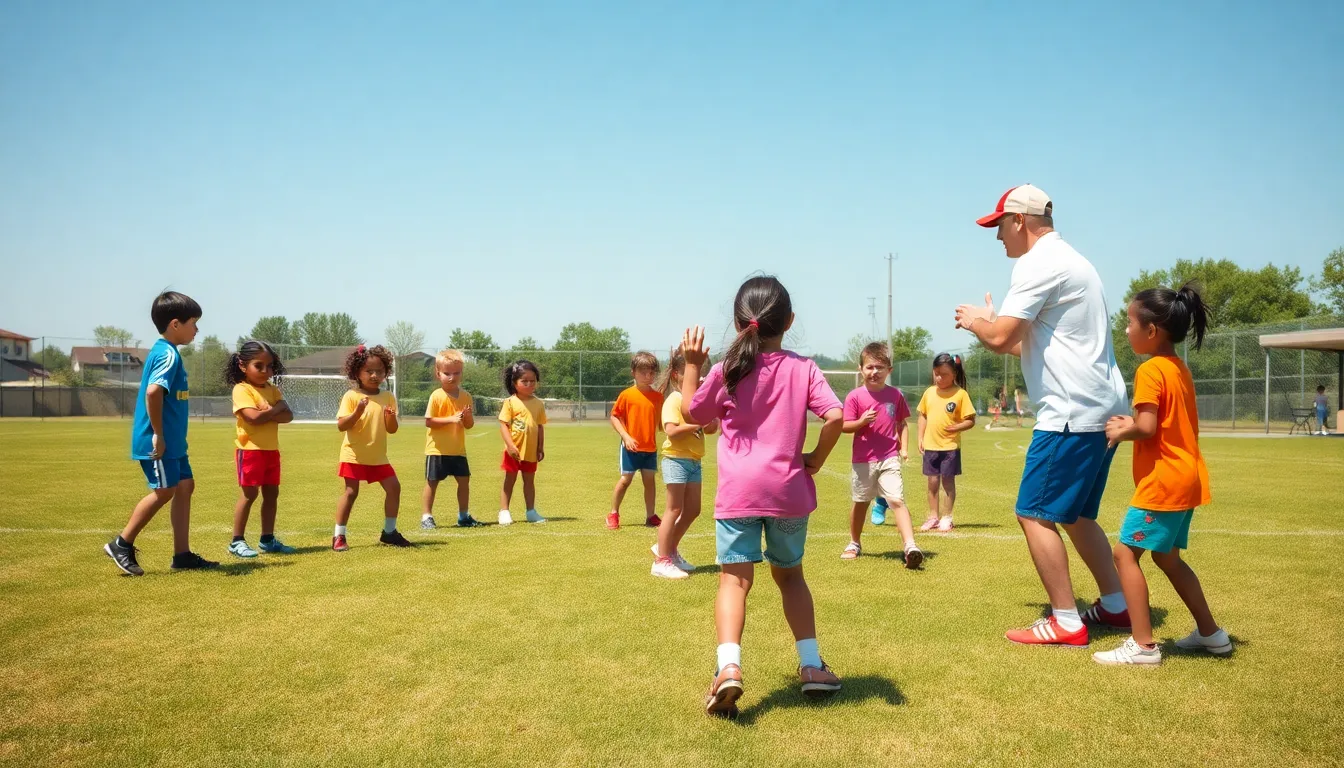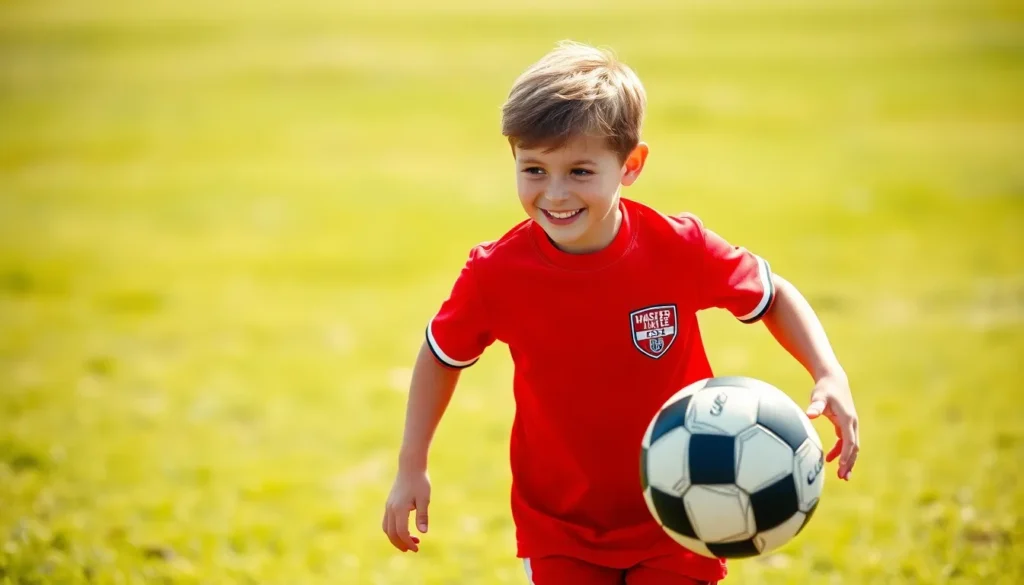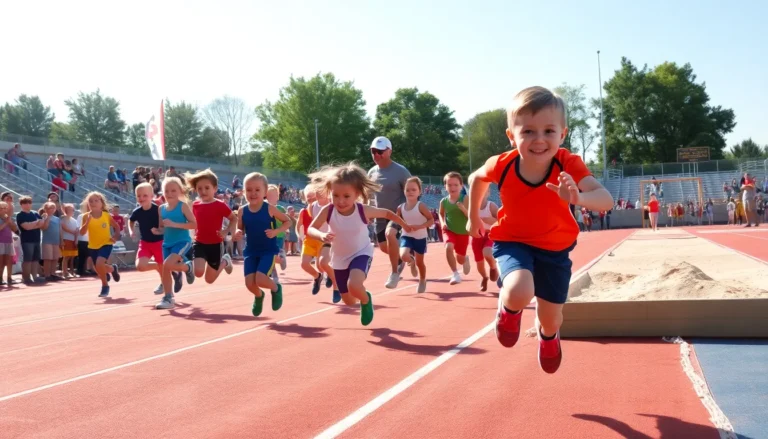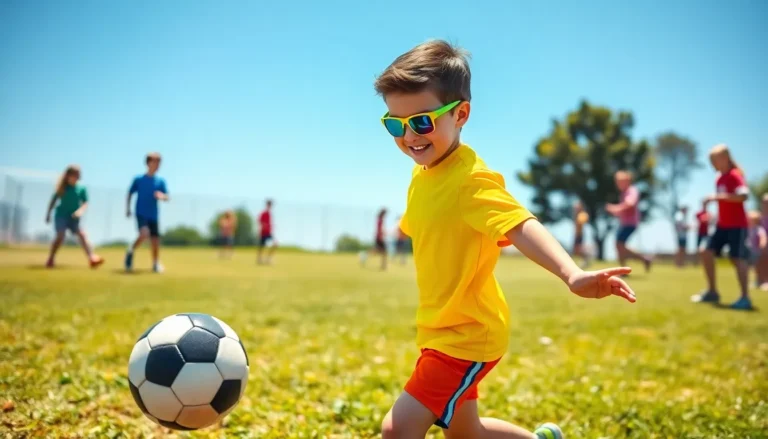Table of Contents
ToggleEvery kid dreams of becoming a superstar, whether it’s shooting hoops like LeBron or scoring goals like Messi. But let’s face it, without a little guidance, those dreams can feel as distant as a unicorn on a treadmill. Enter sports mentors—those magical beings who help kids navigate the wild world of athletics while sprinkling in some life lessons along the way.
Importance Of Sports Mentors For Kids
Sports mentors play a crucial role in shaping children’s athletic and personal development. They not only guide kids in sports but also help them grow as individuals.
Developing Life Skills
Sports mentors teach kids essential life skills. Listening, teamwork, and communication become second nature through engaging in sports. They encourage problem-solving and decision-making, which are vital for success on and off the field. Opportunities for goal setting arise, fostering discipline and work ethic. Kids learn to cope with challenges and failures, an important aspect of resilience. The focus on consistent practice instills habits beneficial for future endeavors, setting a strong foundation.
Building Confidence and Self-Esteem
Confidence and self-esteem flourish under the influence of sports mentors. Consistent guidance helps children recognize their abilities and strengths. Setting and achieving short-term goals encourages a sense of accomplishment, further boosting confidence. Mentors provide constructive feedback, guiding kids on how to improve while celebrating their successes. This balanced approach nurtures positive self-image, making children feel valued and competent. Regular participation in sports promotes a supportive environment, where kids learn to cheer for each other, enhancing their overall self-esteem.
Qualities Of Effective Sports Mentors

Effective sports mentors possess a range of qualities that significantly impact children’s athletic journeys. These traits foster growth both on and off the field.
Experience and Knowledge
Experience and knowledge stand as cornerstones of effective mentorship. They understand the intricacies of various sports and possess firsthand insights. This expertise allows them to provide tailored guidance that suits each child’s needs. Mentors draw from their backgrounds in competitive play, coaching, or sports education. They share practical strategies to improve skills and deepen the understanding of the game. Their ability to adapt lessons to different age groups and skill levels enhances learning. Knowledge of sports psychology and training techniques further enriches mentorship. Such depth turns mentorship into a valuable resource for aspiring athletes.
Communication Skills
Communication skills play a vital role in effective mentorship. Mentors convey ideas clearly and engage children in open discussions. Active listening allows them to understand individual concerns and aspirations. Effective mentors foster an environment of trust where children feel comfortable sharing thoughts. They use simple language to explain complex concepts and provide constructive feedback. Encouragement delivered through positive reinforcement inspires children to take risks and embrace challenges. Mentors also model healthy communication, demonstrating how to express emotions positively. This sets a precedent for effective teamwork and relationship-building skills.
Types Of Sports Mentors
Sports mentors come in various forms, each contributing uniquely to a child’s development in athletics and life. Understanding these roles enhances the mentoring experience for young athletes.
Coaches
Coaches play a primary role in a child’s sports journey. They provide structured training and technical skills tailored to individual needs. Coaches bring extensive experience from competitive play or coaching positions, allowing them to guide young athletes effectively. They focus on teaching essential techniques, creating strategies, and fostering a positive team environment. Coaches also motivate children to push beyond their limits while instilling characteristics such as discipline and resilience. Through regular feedback, they help athletes recognize their strengths and areas for improvement.
Parental Figures
Parental figures serve as critical support in a child’s pursuit of sports. They offer encouragement and serve as role models, sharing their own experiences with sports values. Parents often help children navigate challenges by promoting a healthy balance between sports and academics. They maintain open communication, creating a space where children feel comfortable discussing their aspirations and concerns. By attending games and practices, parental figures demonstrate commitment, which reinforces the child’s dedication. This support structure fosters confidence, motivating kids to pursue their goals with enthusiasm.
Benefits Of Having A Sports Mentor
Sports mentors offer significant advantages for kids, promoting both athletic skills and personal development. Their presence fosters a range of benefits that contribute to a child’s growth.
Physical Health
Engaging with a sports mentor enhances a child’s physical fitness. Increased activity leads to improved cardiovascular health, strength, and flexibility. Structured training sessions focus on essential skills like coordination and endurance. Using varied exercises helps maintain a fun and dynamic approach to fitness, making it easier for children to stay motivated. Regular engagement in physical activities also establishes lifelong healthy habits. Parents notice increased energy levels and overall well-being as kids embrace active lifestyles under the guidance of mentors.
Emotional Support
A strong emotional connection between kids and their sports mentors provides crucial support. Mentors create safe spaces for children to express their feelings and discuss challenges. Through consistent encouragement, mentors boost children’s self-esteem and motivation. Additionally, children learn to manage stress and cope with disappointments in a healthy manner. This emotional safety net promotes resilience, fostering a mindset focused on growth. Such support translates into improved interpersonal skills and healthier relationships, ensuring that children benefit on and off the field.
Finding The Right Sports Mentor
Choosing the right sports mentor can significantly impact a child’s development and aspirations. Key factors play a role in this important decision.
Assessing Compatibility
Compatibility is essential when selecting a sports mentor. Identify mentors who share similar values and coaching philosophies. Evaluate their approach to training and ensure it aligns with the child’s learning style. Consider the mentor’s experience with both the sport and age group. Engaging children in discussions about their preferences can help gauge what they seek in a mentor. Observing potential mentors in their coaching environment provides insights into their methods and interactions with the young athletes.
Reaching Out to Local Programs
Local programs often serve as valuable resources for finding sports mentors. Explore community clubs, schools, and recreational centers that offer structured sports programs. Many of these organizations employ experienced coaches dedicated to developing young athletes. Attending local sports events allows parents to connect with coaches and mentors in person. Additionally, asking for recommendations from other parents can lead to discovering exceptional mentors. Engaging with local sports associations often yields insight into available mentorship opportunities tailored to the child’s needs.
Sports mentors play an invaluable role in shaping the future of young athletes. By offering guidance and support, they help children navigate their athletic journeys while instilling essential life skills. The right mentor can unlock a child’s potential, fostering not only physical abilities but also emotional resilience.
Finding a compatible mentor is crucial for maximizing these benefits. Engaging children in the selection process ensures a strong connection and shared values. As kids pursue their dreams of greatness, having a dedicated mentor by their side can make all the difference in achieving both athletic and personal success. Embracing this mentorship can lead to a brighter future on and off the field.








